
After a period of instability caused by pandemic, inflationary pressures and geopolitical instabilities, the commercial insurance industry is entering a period of stability and opportunity.
The latest “Insurance Market Realities” report from Willis, a WTW company, published on the WTW website, shows that.
“With more than $1 trillion in industry surplus capital and more than $725 billion in reinsurance capacity, insurers are seeking growth across multiple product lines,” the information emphasizes.
Property insurance is entering a soft market, with renewal rates down 8% in the second quarter of 2025 after falling 5.5% in the first quarter. Workers’ compensation insurance also remains favorable thanks to a $16 billion reserve surplus. The combination of significant capacity, excluding excess casualty insurance, and evolving technological capabilities is allowing organizations to provide broader coverage and optimize program structures more efficiently than in recent years.
“Buyers are navigating a very different market now than they were a few years ago,” said John Drummond, global head of insurance management at Willis. “We see significant opportunities for companies to improve their programs and increase their return on insurance spend, even if some lines of business remain under pressure.”
It is also noted that artificial intelligence (AI) is emerging as a defining force in this transformational period. Once a vision of the future, it is now changing underwriting, claims management and product design. AI-powered tools provide deeper insights into risk, enable faster, more informed decisions, and support the creation of products customized to meet new needs.
Despite improving market conditions, the report urges caution. Global losses from insured catastrophes have exceeded $100 billion annually for five consecutive years. Systemic cyber events, financial market turmoil or escalating natural disasters related to climate change could quickly alter current earnings and again lead to volatility in the commercial insurance market.
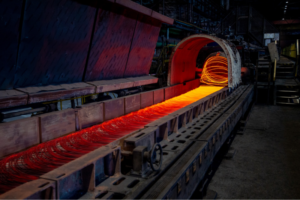
The Kametstal plant of the Metinvest mining and metallurgical group (Kamensk, Dnipropetrovsk region) has begun a series of major repairs of its main rolling equipment under the 2025 program.
According to the company, the first to undergo major renovation was the pipe mill (PM), which produces SVP-27 mine props and large-diameter grinding balls.
It is specified that at the main stage of the overhaul, the efforts of specialists from the metallurgical equipment repair shop and the equipment repair shop are focused on work to upgrade the power, in particular electrical and mechanical, equipment of key large-scale sections, which can only be repaired during a complete and prolonged shutdown of the mill.
Thus, in the rolling mill section, the manipulator lines are being upgraded, the electrical panels of the heating furnaces and the guide bushings of the 900 mill are being replaced. A thorough inspection of the units is being carried out, with all necessary repair operations being performed on the first, second, and third 750 mills. On the roller table field of the rolling mill, to ensure the stability of the rolling movement, the bearings on the rollers and the rollers themselves, worn out due to prolonged operation, are being replaced.
Another important task is to replace a section of the water supply pipeline, which will create an additional backup supply for uninterrupted water supply for the technological needs of the pipe preparation section.
Rolling mill employees, in turn, are cleaning the hydraulic tunnel, removing accumulated scale from the communication structure for technical water drainage.
“This is an important overhaul for the shop and the entire enterprise, aimed primarily at improving the reliability of the pipe mill equipment, which produces strategic SVP-27 profile rolled products for miners. The section is also an important link in the production of billets for large-diameter grinding balls, a product in high demand that is produced on the shop’s ball rolling mills,” the company said in a statement.
Kametstal is part of the Metinvest Group.
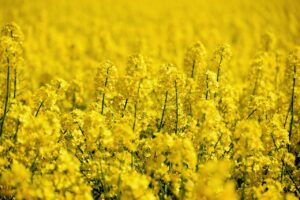
In September 2025, Ukraine processed a record monthly volume of rapeseed, exceeding 250,000 tons. For the first time in a long time, domestic processing exceeded monthly exports of this crop by 236,000 tons, according to the analytical industry agency APK-Inform.
“At the same time, in late September and early October, trade in this sector slowed down due to the expected decision on the mechanism for exempting soybean and rapeseed producers from the 10% export duty. Against this backdrop, the supply of rapeseed decreased,” analysts noted.
Experts added that a number of processors reported low rapeseed supplies to enterprises and the likely completion of its processing and transition to sunflower, stocks of which were accumulated quite well in September.
Nevertheless, plants raised their demand prices for rapeseed in an attempt to attract more offers, to UAH 23,000-23,500/ton CPT and above for real volumes and large batches, according to APK-Inform.
Real GDP percentage changes over previous period in 2014-2025

Source: Open4Business.com.ua
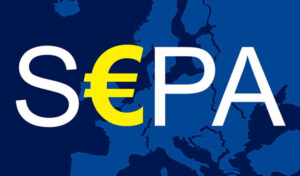
On October 6, 2025, the SEPA (Single Euro Payments Area) payment system officially began operating in Montenegro, allowing transfers in euros to be made at uniform European rates and with minimal fees.
Ukraine is already actively preparing to join SEPA (Single Euro Payments Area). At the moment, the country is not yet a full member of SEPA, but significant legislative and technical preparations are already underway. Below is what is known today and what the prospects may be.
In June 2025, Ukraine officially announced its intention to join SEPA. At that time, it was announced that the relevant plans and draft laws had been submitted to the Verkhovna Rada. Draft law No. 13233 “On Amendments to the Legislative Acts of Ukraine to Ensure Compliance with European Rules and EPC (European Payments Council) Criteria for Joining SEPA” was submitted. In April 2025, the Cabinet of Ministers approved a package of draft laws aimed at harmonizing Ukrainian legislation with EU requirements in the field of anti-money laundering, ensuring transparency and security of payments — an important step towards officially applying for SEPA.
The European Business Association (EBA Ukraine) publicly supports the bill on Ukraine’s accession to SEPA, but requests revisions to a number of provisions relating to financial monitoring, reporting regulations, and data protection.
The National Bank of Ukraine already has a new generation of payment infrastructure (SEP system, ISO 20022 standard) with 24/7 support for SCT (Credit Transfer) schemes, which is considered part of the preparation for SEPA. There are plans to introduce instant payments in euros.
According to experts, market participants (citizens and businesses) will be able to save €70–100 million annually by reducing fees for euro transfers. For businesses, this means lower costs for cross-border payments, simplified financial flows, and fewer intermediaries. For citizens, it means faster payments in euros within SEPA, more transparent conditions, and, possibly, lower transaction fees.
Key current challenges:
SEPA (Single Euro Payments Area) is a single area for cashless payments in euros, including the EU, EEA, Switzerland, the UK, Andorra, Vatican City, San Marino, and now Serbia and Montenegro.
The main goal of SEPA is to simplify and reduce the cost of euro transfers by ensuring the same rules and terms for all participants.
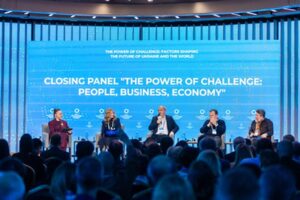
On October 16, Kyiv will host the 11th Kyiv International Economic Forum – a leading platform for dialogue between business, government, society, and the international community. This year’s topic – “Ukraine 2.0: The Power of People” – reflects a key idea: in times of war, the recovery and modernization of Ukraine and global turbulence depend on the specific decisions and actions of people – in business, government, education, and industry.
The Forum will bring together more than 1,000 leaders of Ukrainian and international business, government representatives, investors, and global experts to provide practical answers to critical questions: how to attract investment, scale production, integrate into global supply chains, build energy resilience, and remain competitive amid war and global change.
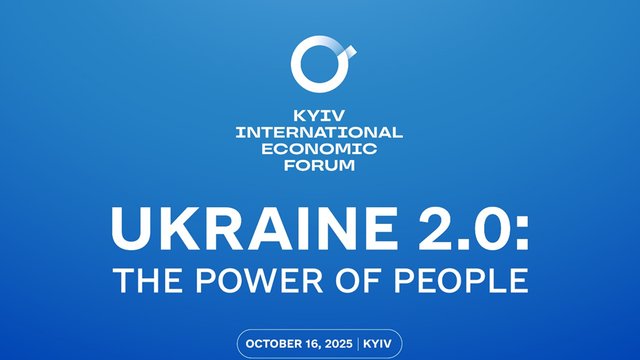
The program includes 15 panel discussions with over 100 speakers.
Key discussions include:
“Ukraine is enduring a prolonged conflict and significant economic pressure. At the same time, the world itself is changing rapidly through technological revolution, a new arms race, the energy transition, demographic shifts. A return to 2022 is impossible – we face a new reality and new opportunities. That is why at KIEF we will find answers to fundamental questions: what Ukraine of tomorrow will look like, how its economy, industry, and energy sector will evolve. And above all – what kind of people will shape and live in this new Ukraine”, emphasizes Yuriy Pyvovarov, CEO of KIEF.
Among the Forum’s speakers:
International leaders
Business leaders and top managers
“The greatest strength and driving force of the country is its people. Those who defend and rebuild, create and make policy decisions, educate children, invest in entrepreneurship, culture, and new technologies, grow themselves every day and choose to develop Ukraine despite all challenges. KIEF 2025 is a space for decisions and partnerships that will shape the country we will live in tomorrow”, notes Vasyl Khmelnytskyi, KIEF initiator, founder of UFuture holding.
Participants from the state sector – including representatives of the Cabinet of Ministers, the Office of the President of Ukraine, and the Parliament – will also join the discussions.
Registration and program updates are available on the Forum’s official website.
This year, the Organizing Committee will direct part of the ticket sales proceeds to support the Soborna Ukraine Charitable Foundation, which helps the families of defenders who died in the war. You can make additional donations to the Foundation via the provided link.
Kyiv International Economic Forum – is the leading platform that brings together international and Ukrainian representatives of business, government, and society to discuss key economic issues and global trends.
Title Partners: Mastercard, AEQUO, UFuture, Work.ua.
Partners: Sense Bank, EFI Group, umgi, MHP, FUIB, DTEK, PrivatBank, NEQSOL Holding, Biopharma, INTERPIPE, Biosphere Corporation, Ajax Systems, CEO Club Ukraine, Epicentr, OKKO, Done, Metinvest, Kyivstar, Balex, GORO Development.
Program Partner: The American Chamber of Commerce in Ukraine (ACC).
Information partner: Interfax-Ukraine.
Business expert: Forbes Ukraine
Title Media Partners: 1+1 media, Starlight Media.
Media Partners: Kyiv Post, LIGA.net, The Kyiv Independent, ФОКУС, Tvoe Misto, RBC-Ukraine, Mind.ua, Delo.ua, УкрІнвестКлаб, Interfax-Ukraine, TAVR Media, Huxley, finance.ua, Мінфін.
Media accreditation form available here.
Contact person for participant registration:
Oleksandra Barabash
Tel: +380 50 880 0010
Email: tickets@forumkyiv.org